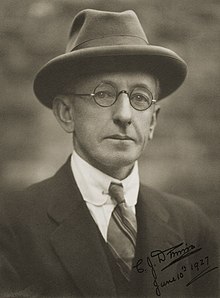C. J. Dennis
C. J. Dennis | |
|---|---|
 | |
| Born | Clarence Michael James Dennis 7 September 1876 |
| Died | 22 June 1938 (aged 61) Melbourne, Victoria, Australia |
| Burial place | Box Hill Cemetery 37°49′21″S 145°8′8″E / 37.82250°S 145.13556°E |
| Occupation | Writer |
| Notable work | The Songs of a Sentimental Bloke |
| Parent(s) | James Dennis Kate Francis Dennis (nee Tobin) |
Clarence Michael James Stanislaus Dennis (7 September 1876 – 22 June 1938), better known as C. J. Dennis, was an Australian poet and journalist known for his best-selling verse novel The Songs of a Sentimental Bloke (1915).[1] Alongside his contemporaries and occasional collaborators Henry Lawson and Banjo Paterson, Dennis helped popularise Australian slang in literature, earning him the title "the laureate of the larrikin".
When Dennis died, Australia's then Prime Minister Joseph Lyons said he was destined to be remembered as the "Australian Robert Burns".[2]
Biography
[edit]
C. J. Dennis was born in Auburn, South Australia. His father owned hotels in Auburn, and then later in Gladstone and Laura. His mother suffered ill health, so Clarrie (as he was known) was raised initially by his great-aunts, then went away to school, Christian Brothers College, Adelaide as a teenager.[1]
At the age of 19 he was employed as a solicitor's clerk. It was while he was working in this job that, like banker's clerk Banjo Paterson before him, his first poem was published[1] under the pseudonym "The Best of the Six".[3] He later went on to publish in The Worker, under his own name,[4] and as "Den", and in The Bulletin. His collected poetry was published by Angus & Robertson.
He joined the literary staff of The Critic in 1897, and after a spell doing odd jobs around Broken Hill, returned to The Critic, serving for a time c. 1904 as editor, to be succeeded by Conrad Eitel.[5] In 1906 he co-founded and edited The Gadfly as a literary magazine; it ceased publication in 1909.
Dennis himself left The Gadfly and Adelaide for Melbourne in November 1907. In 1908, he camped with the artist Hal Waugh at Toolangi, north-east of Melbourne, near Healesville. Toolangi was his home for most of the rest of his life.[1] C. J. Dennis married Margaret Herron in 1917. She published two novels and a biography of Dennis called Down the Years.
From 1922 he served as staff poet on the Melbourne Herald.[6]
C. J. Dennis is buried in Box Hill Cemetery, Melbourne. The Box Hill Historical Society has attached a commemorative plaque to the gravestone. Dennis is also commemorated with a plaque on Circular Quay in Sydney which forms part of the NSW Ministry for the Arts – Writers Walk series,[7] and by a bust outside the town hall of the town of Laura.[8]
In 1976, ABC produced and broadcast The Life And Times Of C. J. Dennis, timed to coincide with the 100th year of Dennis' birth. The docu-drama starred John Derum as Dennis and is set around the time when Dennis produced The Gadfly.[9]
Books
[edit]
- Backblock Ballads and Other Verses (1913)
- The Songs of a Sentimental Bloke (1915)
- The Moods of Ginger Mick (1916)
- The Glugs of Gosh (1917)
- Doreen (1917)
- Digger Smith (1918)
- Backblock Ballads and Later Verses (1918)
- Jim of the Hills (1919)
- A Book for Kids (1921) (reissued as Roundabout, 1935)
- Rose of Spadgers (1924)
- The Singing Garden (1935)
- The Ant Explorer (posthumously, 1988)
Poems
[edit]- "The Austra-laise" (1908)
- "An Old Master" (1910)
See also
[edit]Further reading
[edit]- Philip Butterss (11 April 2014). An Unsentimental Bloke: The Life and Work of C.J. Dennis. Wakefield Press. ISBN 978-1743052877.
References
[edit]- ^ a b c d McLaren, Ian F. "Dennis, Clarence Michael James (1876–1938)". Australian Dictionary of Biography. Canberra: National Centre of Biography, Australian National University. ISBN 978-0-522-84459-7. ISSN 1833-7538. OCLC 70677943. Retrieved 12 July 2012.
- ^ "Australian poet". The Argus. Melbourne. 23 June 1938. p. 2. Retrieved 10 August 2011 – via National Library of Australia.
- ^ "Memories of Laura". The Advertiser. Adelaide. 22 June 1932. p. 8. Retrieved 26 December 2013 – via National Library of Australia. This article reproduces the poem, The Singular Experiences of Six Sturdy Sportsmen as well as other information about Dennis.
- ^ "The Hurling of a Stone". The Worker. Wagga, NSW. 22 May 1913. p. 17. Retrieved 18 March 2015 – via National Library of Australia.
- ^ "The Insect". The Newsletter: an Australian Paper for Australian People. Sydney. 18 November 1905. p. 13. Retrieved 8 January 2016 – via National Library of Australia. The writer has a poor opinion of Mr. Dennis.
- ^ W. H. Wilde et al, eds, The Oxford Companion to Australian Literature, Oxford University Press, Melbourne 1994 ISBN 0 19 553381 X
- ^ "Australian Literary Monuments #18 - C. J. Dennis - Matilda". www.middlemiss.org.
- ^ "Australian Literary Monuments #3 - C. J. Dennis - Matilda". www.middlemiss.org.
- ^ Groves, Don (28 February 1976). "C. J. Dennis, Laureate of the Larrikin". TV Times. Australian Broadcasting Commission / Australian Consolidated Press.
External links
[edit]- Australian Dictionary of Biography entry
- Works by C. J. Dennis at Project Gutenberg
- Works by or about C. J. Dennis at the Internet Archive
- Works by C. J. Dennis at Project Gutenberg of Australia
- Works by or about Clarence James Dennis at the Internet Archive
- Works by C. J. Dennis at LibriVox (public domain audiobooks)

- Australian Authors – C. J. Dennis
- Philip Butterss " Your Vote is Wanted": C. J. Dennis at the Call' JASAL 7 (2007)
- Jack Thompson reads poems by C. J. Dennis
